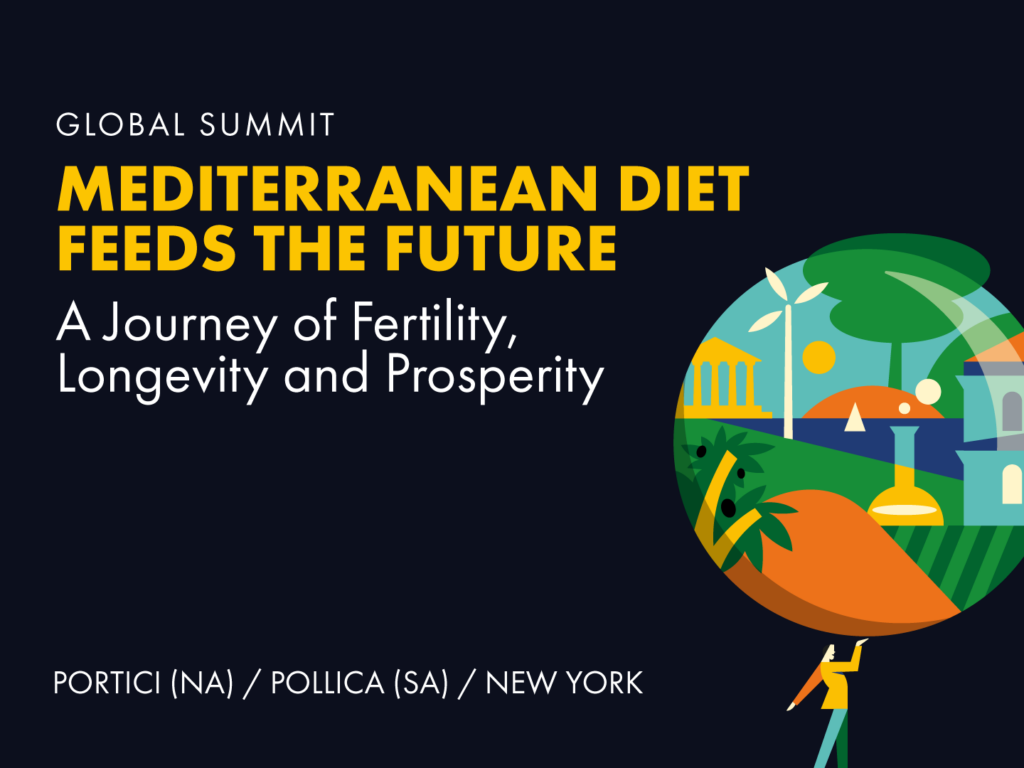14th Anniversary of the Mediterranean Diet as UNESCO Heritage
November 14-17 in Portici and Pollica, Italy – November 21-22 in New York
In celebration of the Mediterranean Diet’s designation as a UNESCO Intangible Cultural Heritage, a major event spanning Italy and the U.S. will unfold. From November 14 to 17, the Italian towns of Portici (NA) and Pollica (SA)—Pollica being an emblematic Italian community where Ancel Keys developed his research on the Mediterranean diet—will host discussions centred on the diet’s role as a model of sustainable development. This dialogue will expand to a global stage at the United Nations in New York on November 21-22, showcasing the Mediterranean Diet’s potential for positive environmental and health impacts globally at the United Nations.
Highlight on the Summit and Organizing Partners
The “Mediterranean Diet Feeds the Future” Summit stands as a platform for interdisciplinary collaboration, bringing together experts, policymakers, and community leaders. Hosted by the Comune di Pollica, with its vibrant ties to the Mediterranean diet’s origins, this summit underscores the commitment of partners like the Future Food Institute, University of Naples’ Department of Agriculture in Portici, the UNESCO Chair at Unitelma Sapienza, and MedEatResearch at Suor Orsola Benincasa University. Supported by the Campania Region and the Italian National Commission for UNESCO, this event amplifies the Mediterranean diet’s significance beyond a dietary model to one of cultural and environmental sustainability.
Themes and Objectives of the Summit
With a deep focus on scientific progress and community-based case studies, the summit explores the Mediterranean diet’s contributions to global well-being. Six primary areas guide the discussions:
- Public Policy and the Mediterranean Diet – examining sustainable agricultural policies.
- Biodiversity and Sustainable Agriculture – discussing preservation and responsible food production.
- Health Impact – evaluating the diet’s role in promoting physical well-being.
- Social Cohesion and Mental Health – considering the role of shared meals and community.
- Cultural Heritage Preservation – focusing on cultural transmission of Mediterranean diet values.
- Economic Development – spotlighting tourism and local gastronomy’s role in sustainable economies.
Through panels, interactive discussions, and cultural events, the summit will delve into the Mediterranean diet as a foundation for holistic health and sustainability, integrating these values with modern development goals.
Legacy of Pollica in the Mediterranean Diet
Pollica, in the Cilento (Salerno), Italy, is central to the Mediterranean diet’s heritage and preservation efforts. As the site of Ancel Keys’ foundational research, Pollica has long embodied the Mediterranean lifestyle. The town hosts the “Living Museum of the Mediterranean Diet” at Palazzo Vinciprova in Pioppi, a centre dedicated to educating and celebrating this heritage through interactive exhibits, local community involvement, and annual events like the Mediterranean Diet Festival.
The Way Forward: Global Presentation at the United Nations
The dialogue on the impact of the Mediterranean diet will culminate in New York, where summit outcomes will be presented to global leaders. Hosted at the UN headquarters, this extension of the summit aims to inform international food and environmental policy discussions, fostering a collaborative model for sustainable practices across cultures and communities.
The summit and its global outreach mark a renewed commitment to preserving and enhancing the Mediterranean diet as a model for health, environmental care, and cultural identity, fostering a path toward sustainable futures worldwide.

